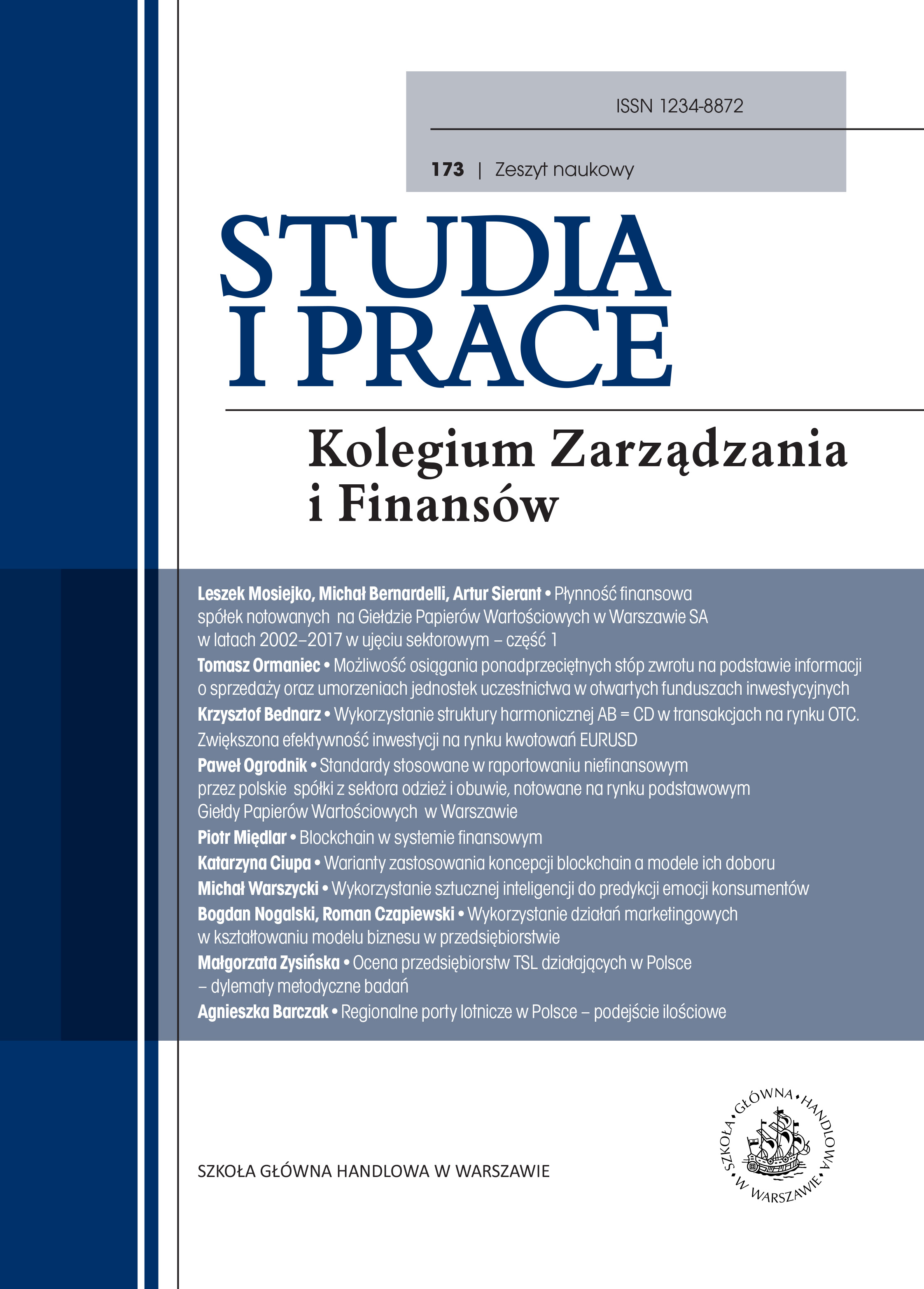Wykorzystanie sztucznej inteligencji do predykcji emocji konsumentów
DOI:
https://doi.org/10.33119/SIP.2019.173.7Słowa kluczowe:
sztuczna inteligencja, marketing w Internecie, konsumentAbstrakt
Przedmiotem artykułu jest problematyka wykorzystania sztucznej inteligencji do przewidywania reakcji zakupowych konsumentów. Celem artykułu jest przedstawienie możliwości wykorzystania sztucznej inteligencji do przeprowadzenia predykcji emocji konsumentów dokonujących zakupów w Internecie. Predykcja ta może służyć do przedstawienia konsumentom oferty produktowej dopasowanej do ich potrzeb konsumpcyjnych. W artykule, w pierwszej kolejności, zaprezentowano wynik analizy literatury zawierającej definicje sztucznej inteligencji. Zaproponowano autorską interpretację tego pojęcia. Przedstawiono sposób pozyskiwania informacji o konsumentach, zakodowanych w formie elektronicznej.
Następnie opisano wykorzystanie sztucznej inteligencji do zadań predykcji preferencji zakupowych konsumentów na potrzeby przedstawienia im dopasowanej oferty produktowej. W rezultacie zaproponowano proces dopasowania do indywidualnego konsumenta oferty produktowej z wykorzystaniem informacji o jego emocjach, na podstawie rozwiązań z obszaru sztucznej inteligencji. Proces ten może być wstępem do prowadzenia dalszych badań w tym zakresie.
Downloads
Bibliografia
2. Brandys J. [2016], Marketing doświadczeń – założenia i perspektywy, „Zeszyty Naukowe Wyższej Szkoły Zarządzania i Bankowości w Krakowie”, nr 42, s. 13–22.
3. Govoni N. A. [2004], Dictionary of Marketing Communications, Sage, USA.
4. Iyengar S. S., Lepper M. R. [2000], When Choice is Demotivating: Can One Desire Too Much of a Good Thing?, „Journal of Personality and Social Psychology”, vol. 79, no. 6, s. 995–1006.
5. Kietzmann J., Paschen J., Treen E. [2018], Artificial Intelligence in Advertising: How Marketers Can Leverage Artificial Intelligence Along the Consumer Journey, „Journal of Advertising
Research”, vol. 58, no. 3, s. 264.
6. Kwaśnik Z., Żukow W. [2009], Aktualne wyzwania ekonomii, Radomska Szkoła Wyższa, Radom.
7. Lazer D., Pentland A., Adamic L., Aral S., Barabasi A. L., Brewer D., Christakis N., Contractor N., Fowler J., Gutmann M., Jebara T., King G., Macy M., Roy D., Van Alstyne, M. [2009],
Life in The Network: The Coming Age of Computational Social Science, „Science”, vol. 323, no. 5915, s. 721–723.
8. Matz S. C., Gladstone J. J., Stillwell D. [2016], Money Buys Happiness When Spending Fits Our Personality, „Psychological Science”, vol. 27, no. 5, s. 715–725.
9. Nilsson.J. [2014], Principles of Artificial Intelligence, Morgan Kaufmann, Palo Alto.
10. Pujer K. [2016], Informatyka i marketing w organizacjach. Teoria i praktyka, Exante, Wrocław.
11. Schalkoff R. J. [1990], Artificial Intelligence: An Engineering Approach, McGraw-Hill Education, USA.
12. Unluturk M. S., Kaya O., Coskun A. [2009], Emotion Recognition Using Neural Networks, Proceedings of the 10th WSEAS International Conference on Neural Networks, Izmir.
13. Vesanen J., Raulas M. [2006], Building Bridges for Personalization: A Process Model for Marketing, „Journal of Interactive Marketing (John Wiley & Sons)”, vol. 20, no. 1, s. 5–20.
14. Vogelsang M. [2010], Digitalization in Open Economies: Theory and Policy Implications, Physica-Verlag, Wuppertal.
Materiały internetowe
1. DeVault G., Consumer Profile: Defining the Ideal Customer, www.thebalancesmb.com/consumer-profile-defining-the-ideal-customer-2296932 [dostęp 12.11.2018].
2. John McCarthy [2018], Elektroniczne muzeum komputerów, www.computerhistory.org/fellowawards/hall/john-mccarthy [dostęp 10.11.2018].
3. Marr B. [2017], The Next Frontier Of Artificial Intelligence: Building Machines That Read YourEmotions, www.forbes.com/sites/bernardmarr/2017/12/15/the-next-frontier-of-artificial-intelligence-building-machines-that-read-your-emotions [dostęp 17.11.2018].
4. McCarthy J. [2007], What is Artificial Intelligence?, jmc.stanford.edu/articles/whatisai/whatisai.pdf.
5. SAS Institute [2018], Artificial Intelligence: What It Is and Why it Matters, www.sas.com/en_nz/insights/analytics/what-is-artificial-intelligence.html [dostęp 18.09.2018].
6. www.britannica.com [dostęp 15.08.2018].
7. www.collinsdictionary.com [dostęp 02.10.2018].
8. www.encyklopedia.pwn.pl [dostęp 14.11.2018].









